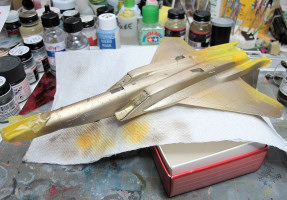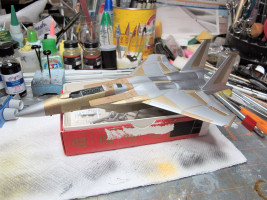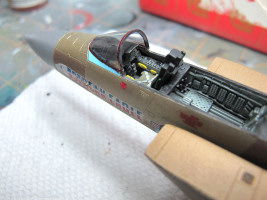
Hasegawa 1/72 F-15A Streak Eagle Kit Build Review
By Chuck Holte
| Date of Review | August 2015 | Manufacturer | Hasegawa |
|---|---|---|---|
| Subject | F-15A Streak Eagle | Scale | 1/72 |
| Kit Number | 00700 | Primary Media | Styrene |
| Pros | Box art, white metal parts (test boom & vanes), special decals | Cons | Usual fuselage fit issues, little reference to what makes the Streak Eagle "special" or what to modify to make it so |
| Skill Level | Experienced | MSRP (USD) | Out of production |
Build Review
The McDonnell Douglas (now Boeing) F-15A Eagle was developed for the USAF as a replacement for the McD F-4 Phantom in the late '60s. A large twin-engine, high performance, all-weather, air superiority fighter, the Eagle was first flown in 1972 and entered the USAF inventory in 1974. With a low "weight to wing area" ratio, it was the first US fighter to have available engine thrust greater than weight of the aircraft, allowing it to accelerate while in a vertical climb.
To highlight that vertical climb capability, a new, preproduction F-15A , USAF 72-0119, dubbed "Streak Eagle," was selected off the St Louis McDonnell Douglas line to attempt world records for "Time to Climb" at Grand Forks AFB North Dakota in January 1975 . The Streak Eagle was stripped of unnecessary equipment such as the gun, fire control system, pylons, one of the two hydraulic packs and bleed air systems, landing lights, Head Up Display (HUD) and, of course, paint. With two production Pratt and Whitney (P&W) F-100-PW-100 engines producing a total of nearly 48,000 lbs of thrust, Streak Eagle set eight world Time to Climb records between 16 January and 1 February 1975.
The final record flight reached 98,000 feet in 3 minutes, 27.8 seconds from brake release, and "coasted" to nearly 103,000 feet before descending for a landing at Grand Forks AFB. The aircraft was then returned to Edwards AFB CA for further flight test activities. Streak Eagle was retired to the National Museum of the US Air Force in December 1980, where it remains in storage status. Additional information about the people, aircraft and record setting flights may be found at the P&W News site: Streak Eagle
The 1/72 Hasegawa F-15A "Streak Eagle" kit is a 2004 re-box of their elderly F-15A kit, but this time includes a new white metal nose test boom and vanes and a Strike Eagle decal sheet. The box art is attractive and gives a semi-accurate depiction of the aircraft's bare metal finish from the perspective of the starboard nose quarter. The instructions were a bit disappointing in that they did not go into the history of the record breaking aircraft, nor did they discuss what modifications, other than the test boom, needed to build the Streak Eagle. The two page black & white painting/decal guide attempted to point out the different shades of bare metal needed, but I found them difficult to follow. The kit's 6"x4" decal sheet provides cockpit decals and a half-dozen markings unique to the Streak; the rest of the sheet includes the multitude of stenciling for a production Eagle, but NOT used on the Streak Eagle.
Instead of the Hasegawa decals, I used the recently released Rocketeer Decals sheet 72018, "Challengers Ultimate," which covers the Streak Eagle and the Sukhoi P-42 (early Su-27), a later "Time to Climb" record holder. The Rocketeer package includes a much better color painting and decal instruction guide, the decals are thinner and include several markings not provided on the Hasegawa sheet.
Modifications I made to the Hasegawa kit included deleting the cockpit HUD, covering the 20mm gun port, removing a scoop and vent on the underside of the starboard wing glove, shortening the speed brake panel, removing several fuselage UHF antennas and the landing lights, per reference photos. I added the test boom to the nose, scratch built the orange cockpit camera mount and camera attached to the starboard side of the cockpit adjacent to the ejection seat, and added the white VHF antenna to the aft canopy deck cover.
Painting included Tamiya rattle-can surface primer, followed by numerous mixed shades of Alclad II metallic and clear lacquer. I tried to follow both the Rocketeer painting guide and reference photos from the internet, going with the internet photos whenever there was a conflict. In my mind, the shading of the aircraft's bare skin was a critical part of the project so I did a lot of color test shots on a spare fuselage and wings before committing my Iwata HP-CH airbrush to the model. Tamiya tape was used exclusively for the multi-layer masking and resulted in a softball-size wad of used tape when I finally pulled it all off.
The Rocketeer decals finished off the project. They were applied over a thin coat of Future applied only where decal would be placed. The decals are very thin, do not silver, but have a tendency to turn on themselves. Fortunately, I had two Rocketeer sheets and I used a fair number from the second sheet. After the decals were set, airbrushed Floquil flat was used to kill the decal shine.
I'm happy with my Streak Eagle of many colors. I enjoyed doing the research and trying to create the various shades that identify the naked Eagle as a Streaker. With full credit to Ray Stevens' once popular song, The Streak, "Don't look Ethel!!!...but I wuz too late, she'd already been Mooned."
Model on!





























